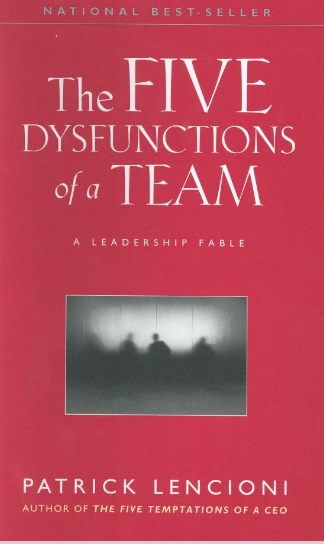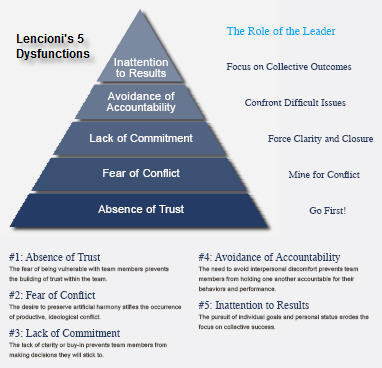Five Dysfunctions of a Team
March 1, 2012

These are my “book notes” from reading FIVE DYSFUNCTIONS OF A TEAM, by Patrick Lencioni.

1) Inattention to Results = Status & Ego
– the key is to make the collective ego greater than the individual ones.
– use results to define success.
– if the team loses, everyone losses.
– great athletes’ egos are usually tied to a clear result: winning.
– we aren’t going to leave any room for interpretation when it comes to our success, because that only creates the opportunity for individual ego to sneak in.
– adopt a set of common goals & measurements & use them to make a collective decision on a daily basis.
* Politics- is when people choose their words & actions based on how they want others to react rather than based on what they really think.
2) Avoidance of accountability = low standards
3) Lack of Commitment = Ambiguity
– a failure to buy into decisions.
– some teams get paralyzed by their need for complete agreement & their inability to move beyond debate.
– disagree & commit.
– they need to weigh in before they can really buy in.
4) Fear of conflict = Artificial Harmony
5) Absence of trust = Invulnerability
– trust is the foundation of real teamwork.
* Illus: Share strengths & weaknesses.
* Film vs. Meetings
– if we cannot learn to engage in productive, ideological conflict during meetings, we are through.
– every great movie has conflict. Without it, we just don’t care what happens to the characters.
“If everything is important then nothing is.”
Positive things I learned:
1) They trust one another.
2) They engage in unfiltered conflict around ideas.
3) They commit to decisions & plans of action.
4) They hold 1 another accountable for delivering against those plans.
5) They focus on d achievement f collective results.
UNDERSTANDING AND OVERCOMING THE 5 DYSFUNCTIONS:
Dysfunction 1: Absence of Trust
– trust lies at the heart of a functioning, cohesive team.
– teammates must get comfortable being vulnerable with 1 another & be confident that their respective vulnerabilities will not b used against them.
Vulnerability based trust.
a) Personal Histories
Exercise
– first job, worst job, siblings, hometown, unique challenges of childhood, hobbies. (Minimum time 30mins)
b) Team Effectiveness Exercise (min time 60mins)
c) Personality & Behavioral Preference Profiles
– MBTI Myers Briggs Type Indicator (min time 4 hours)
d) 360 degree
feedback
– provide 1 another with constructive criticism.
e) Experiential Team
Exercise
ropes courses, although it doesn’t always translate directly to the working world.
*Regular follow up in the course of daily work.
Dysfunction 2: Fear of Conflict
– tools TKI Thomas-Kilmann Conflict Mode Instrument
Dysfunction 3: Lack of Commitment
– Commitment is a function f clarity & buy
Dysfunction 4: Avoidance of Accountability
– the willingness of team members to call their peers on performance or behaviors that might hurt the team.
– the most effective & efficient means of maintaining high standards of performance on a team is peer pressure. There is nothing like the fear of letting down respected teammates that motivates people to improve their performance.
a) Publication of goals & standards.
b) Simple & Regular progress reviews.
c) Team Rewards
Dysfunction 5: Inattention to Results
– the tendency of members to care about something other than the collective goals of the group. An unrelenting focus on specific objectives & clearly defined outcomes is a requirement for any team that judges itself on performance.
* Teamwork ultimately comes down to practicing a small set of principles over a long period of time.
– success is not a matter of mastering subtle, sophisticated theory, but rather of embracing common sense with uncommon levels of discipline & persistence.








